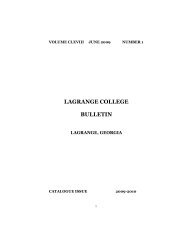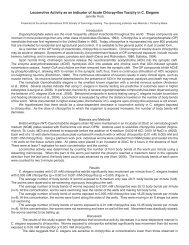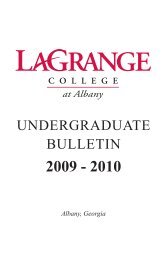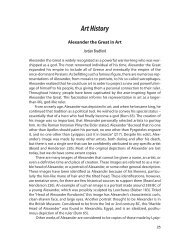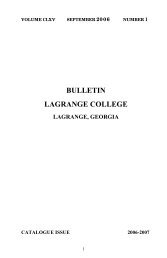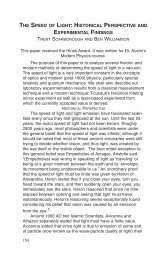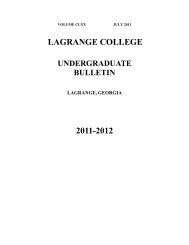Works of Mercy as a Vital Component to Sanctification - LaGrange ...
Works of Mercy as a Vital Component to Sanctification - LaGrange ...
Works of Mercy as a Vital Component to Sanctification - LaGrange ...
Create successful ePaper yourself
Turn your PDF publications into a flip-book with our unique Google optimized e-Paper software.
<strong>Works</strong> <strong>of</strong> <strong>Mercy</strong> <strong>as</strong> a <strong>Vital</strong> <strong>Component</strong> <strong>to</strong> <strong>Sanctification</strong><br />
ministry, Wesley began <strong>to</strong> recognize the unique contributions<br />
each act <strong>of</strong> love held in transforming him in<strong>to</strong> the image <strong>of</strong> God.<br />
Moreover, Wesley recognized that works <strong>of</strong> mercy were <strong>of</strong>ten<br />
looked over <strong>as</strong> secondary, although they were a requisite ingredient<br />
in sanctification. Wesley believed that limiting works <strong>of</strong><br />
mercy limits one’s own spiritual development and ultimately<br />
God’s love.<br />
CONCLUSION<br />
In correlation with Wesley’s context, <strong>to</strong>day’s church<br />
seems <strong>to</strong> overlook works <strong>of</strong> mercy <strong>as</strong> an essential means <strong>of</strong><br />
experiencing and receiving God’s grace. A denomination that<br />
proudly proclaims Wesleyan heritage h<strong>as</strong> forgotten or is not<br />
insisting upon works <strong>of</strong> mercy <strong>as</strong> a definitive element in sanctification.<br />
This is not <strong>to</strong> say that the Methodist Church is not promoting<br />
works <strong>of</strong> mercy <strong>as</strong> a necessary part <strong>of</strong> the Christian life.<br />
Rather, the capability and necessity <strong>of</strong> works <strong>of</strong> mercy <strong>to</strong> act <strong>as</strong><br />
a means <strong>of</strong> grace is not being recognized fully. Somewhere<br />
along the way works <strong>of</strong> piety h<strong>as</strong> taken the position <strong>of</strong> providing<br />
the chief element <strong>of</strong> transformation, and the transformative element<br />
<strong>of</strong> works <strong>of</strong> mercy h<strong>as</strong> been overlooked. Furthermore,<br />
instead <strong>of</strong> going hand in hand with works <strong>of</strong> piety, the two <strong>of</strong>ten<br />
struggle against each other. As a result, the Wesleyan harmony<br />
<strong>of</strong> the two h<strong>as</strong> been lost, and works <strong>of</strong> mercy have become<br />
duties and obligations <strong>to</strong> fulfill.<br />
This point <strong>of</strong> view is more applicable <strong>to</strong> the local church<br />
and not necessarily pertinent <strong>to</strong> the national or worldwide<br />
Methodist movement. A foremost component <strong>to</strong> the problem is<br />
the failure <strong>to</strong> include works <strong>of</strong> mercy <strong>as</strong> a vital means <strong>of</strong> grace.<br />
This component may be a cause <strong>of</strong> some <strong>of</strong> the social apathy at<br />
the local level. A first step in alleviating the indifference <strong>to</strong> works<br />
is <strong>to</strong> proudly proclaim the magnitude <strong>of</strong> works <strong>of</strong> mercy <strong>as</strong> a<br />
means <strong>of</strong> grace. When the transformative <strong>as</strong>pect that works <strong>of</strong><br />
mercy can bear on one’s spiritual standing is proclaimed, then<br />
giving <strong>to</strong> the poor will become more than a se<strong>as</strong>onal event, getting<br />
involved in mission work will become more than sending a<br />
check, and the overall selfishness <strong>of</strong> the American society will<br />
begin <strong>to</strong> change. Furthermore, a ministry <strong>to</strong> the poor might<br />
override church maintenance, the American Dream may be<br />
overtaken by the Great Commission, and people <strong>of</strong> the laity will<br />
begin <strong>to</strong> see themselves <strong>as</strong> ministers. 84<br />
This change <strong>of</strong> attitude <strong>to</strong>ward works <strong>of</strong> mercy and the real-<br />
176



